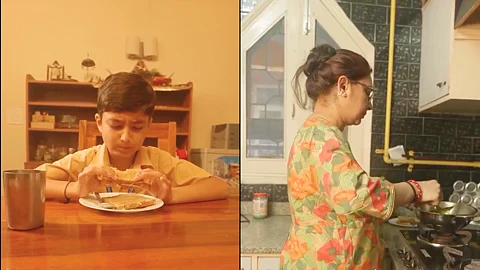
- HOMEGROWN WORLD
- #HGCREATORS
- #HGEXPLORE
- #HGVOICES
- #HGSHOP
- CAREERS
- ABOUT US
- CONTACT US

There’s a specific kind of chaos that unfolds in Indian homes every morning, a choreography so intricate and so unspoken that it might as well be passed down like your dad's anger issues. In one corner, the pressure cooker is hissing, in another, a child is hopping on one foot while trying to tie the other shoe. A parent is spooning sabzi into a steel dabba, not because the child likes it, but because there is no time left to renegotiate the menu.
Sourabh Yadav’s 'Accha Tiffin' taps into this rush-hour theatre, but instead of merely celebrating its warmth, he turns the lens toward something sharper. The short film begins with the familiar: the ritual of 'Maa ke haath ka khana': the unspoken love language of an Indian household. But soon, it unsettles you. What does it mean, after all, to remember your childhood lunches with both joy and guilt? To recall the crunch of a perfectly fried puri while also recognising the invisible labour — and sometimes pain — that plated it?
Yadav complicates nostalgia. In his world, the tiffin is a container of contradictions: the boundless wants of children who have yet to learn empathy, the love of parents that occasionally smothers, and the unacknowledged exhaustion tucked between chapatis. The final scene of Accha Tiffin leaves you stranded in this emotional in-between — not quite sure whether to smile or squirm.
Too often, we flatten “maa ke haath ka khana” into a sentimental cliché, forgetting that memories are rarely that clean. Yadav’s work reminds us that food is a biography — of the person who eats it and the person who cooks it — and sometimes those biographies are tangled in ways we don’t want to read.
Shot by Anish Jain and brought to life by a small but compelling cast, Accha Tiffin feels less like a family album: candid, slightly messy, and all the more real for it.
